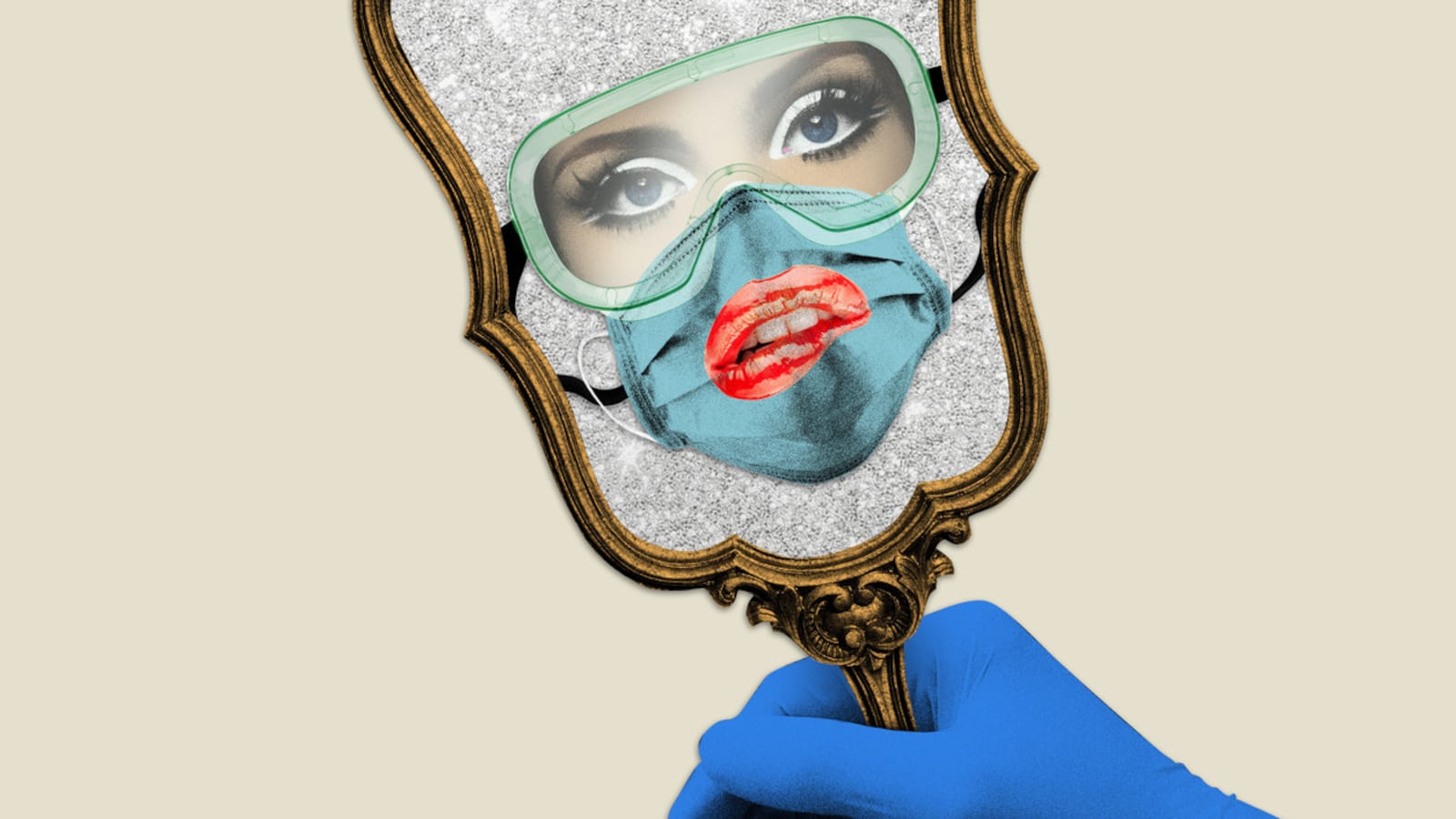“We’ve missed you!” reads the pink and orange font on Ulta’s website. The massive beauty chain, which operates over 1,200 retail stores across America, reopened 180 locations this week after closing in mid-March.
But shoppers eager to splurge on their favorite face mask or skin serum will find it’s not business-as-normal inside these doors.
Arkansas, Nebraska, Oklahoma, South Dakota, Tennessee, Texas, and Utah are home to the shops that are welcoming customers inside once again; hair services will also be provided in some states. Store employees and guests must wear masks, occupancy will be limited to promote social distancing, salon services are appointment-only to deter walk-ins, and staff will conduct mandatory wellness checks before clocking in (this includes taking their temperature and requiring they complete a health questionnaire.)
Along with that, tester products—such as a display lipstick or blush sample—are off-limits for using, though the makeup will be on display for anyone who wants to peek at a shade.
Though Ulta would not provide a number of how many people entered its store on the first day back, vice president of public relations Eileen Ziesemer told The Daily Beast salons in some Texas stores were “about 90 percent booked.”
“That shows a little bit of the pent-up demand to get back,” Ziesemer said. “There’s an eagerness, and I think everything is going as well as we could have hoped... So far, so good.”
Ziesemer added that “safety is the top priority” when deciding to resume operations. “We look at the prevalence of COVID-19 cases [near stores] and that lets us know how we can reopen to ensure that our guests, associates, and the communities we serve are going to be safe.” In states that have not loosened social distance guidelines, curbside pickup is available.
Of course, there is a financial motivation to get people shopping once again, though Ziesemer declined to provide figures related to performance during the roughly month-and-a-half Ulta closed. (During the pandemic, people have been able to buy online as usual, though shipping times have been delayed.)
Ulta furloughed an undisclosed number of employees on April 19, and those workers have not been asked to return just yet. CEO Mary Dillion has not taken a salary since that date and donated $500,000 to a relief program for beauty associates.
News of Ulta’s return does not come without detractors, especially among very online makeup fans who believe the move comes too soon to be safe. “Do you think it’s too premature for stores to reopen?” the industry watchdog Instagram account Estée Laundry asked followers last weekend.
Anonymous staff at Sephora, the nation’s other top beauty chain, told the reporter Sarah Jaffe at Dissent magazine that “[employees] were told they would be expected to return to work as soon as the city allowed them to reopen.” (Sephora has not yet announced plans to do this.)
Across the country, shoppers are reframing what they consider an “essential” purchase; beauty products seem especially frivolous. “We’re not going to say we’re essential in everybody's lives, but we do sell essential goods like shampoos and conditioners,” Ziesemer said. “While I wouldn’t argue that lipstick is essential, I would say that personal hygiene and things of that nature certainly are.”
Ziesemer added, “Every consumer across the country is going to have different levels of comfort as retail reopens.”
Indeed, the stores that have started to phase into some semblance of a rebound are charting a new, historic course that will lay the foundation for post-pandemic battle plans. Nordstrom, Kohl’s, and Macy’s have all planned reopenings in states that allow for it, with plexiglass shields at checkout and socially distant floor plans appearing to become the norm.
“Possibly more than any other type of store, the beauty in-store shopping experience has to be completely rethought,” Elizabeth Shobert, the vice president of marketing and digital strategy for the retail analytics company StyleSage, said. “At the core of that experience has been sampling and face-to-face interactions with advisors, both of which are extremely high-risk interactions. Hygiene and safety, and customers following these new rules, are going to be paramount for beauty stores to reopen successfully.”
One currently furloughed Ulta worker who serves as a skin therapist at a Louisiana store told The Daily Beast that her job is impossible to do at a “safe social distance.” (She has not been asked back to work yet as facial services are currently suspended.)
“As a skin therapist, I perform facial and makeup services on my guest,” the worker, who asked to remain anonymous, said. “Not only am I in my clients’ personal space and touching their face throughout the entirety of the service, but it would be impossible for my clients to wear a mask during their services.”
Even if the employee resumed working on the store floor, rather than in the salon, she would be nervous: “It’s hard to show someone a product and how it works when we are six feet apart. I also have no control over how close a guest decides to get to me.”
All reopenings hinge on the premise that customers will adhere to strict guidelines; this is not always the case.
The Ulta employee last clocked in on March 14, a few days before her store shuttered completely. “At the time, social distancing was encouraged, but everyone shopped like it was a regular day,” she recalled. “Things like color-matching were suspended and a lot of customers weren’t very understanding of that.”
The employee added, “From what I have seen throughout my weekly essential trips to the grocery store and hearing from my brother who works in another retail store, social distancing is not really respected or enforced, so I’m not sure [if] we will be experiencing that too.”
According to Ulta’s press office, “Should a guest not wear a mask or shop too closely to another guest/associate, the store’s manager on duty will respectfully engage them as part of our new “Approach and Request” policy.”
This means that the associate will “politely ask that they wear a face covering or help maintain the social distance of six feet of separation for the safety and health of our guests and associates in store. If the guest does not have a mask, the associate may suggest they opt to shop via curbside pickup or online for delivery to ship to their home. Should they refuse to wear a face covering, the associate will step away from the guest and service them as safely as possible.”
Rachel Weingarten, a beauty writer and historian, is particularly hopeful that these guidelines might kill off the idea of product testers for good. “One of the things that we need to realize is the system of sampling beauty products in stores has been broken and terrifying for a really long time,” she said. “If it took coronavirus for these stores to step up and take responsibility for the teeming masses of germs that float around those testers, it’s actually a good thing.”
Hygiene has always been a concern for the beauty product testing system. In 2017 a woman sued Sephora, alleging she contracted herpes from a lipstick she tried on in a California location. (The retailer later reached an undisclosed settlement.)
Ulta representatives have touted their Glamlab Virtual Makeup Try-On system as a safer alternative that might remain popular even after the pandemic ends. This allows shoppers to see how different shades of lipstick, eyeshadow, and other makeup look on various skin tones.
“As much as everyone says that retail is dead, the coronavirus is showing us that we miss that socializing,” Weingarten said. “We miss that interaction. [Stores opening] let people look each other in the eye and nod over their masks and acknowledge the shared loss that we all have.”







